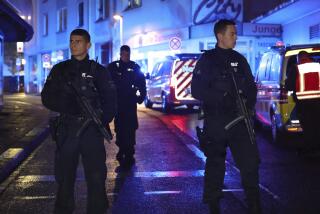Terrorists Kill W. German Defense Industry Executive
BONN — A prominent defense industry executive was shot and killed at his home near Munich on Friday in the latest escalation of West German terrorist activity, which has also been directed at U.S. military installations.
West German law enforcement officials said that Ernst Zimmermann, chief executive officer of Motoren und Turbinen Union, a Munich-based producer of engines for tanks and aircraft, was shot by an unknown assailant armed with an automatic weapon after two people forced their way into his home.
Police said that a woman went to the Zimmermann home and told the industrialist’s wife that she had a package to deliver but needed Zimmermann’s signature. When Zimmermann came to the door, a man with a gun appeared, and the two forced their way inside and tied and gagged both Zimmermanns.
After what was described as a brief discussion, the male suspect forced Zimmermann into another room and shot him. The two suspects were described as being in their mid-20s.
Authorities said the ultraleftist Red Army Faction urban terrorist group has claimed responsibility for the shooting. A widespread search was reported to be under way, and security was tightened at the West German-Austria border.
The killing was the latest incident in a wave of terrorist violence that began in December and is aimed mainly at North Atlantic Treaty Organization installations and other defense-related targets.
However, the approximately 60 previous attacks have been bombing and arson incidents apparently intended to destroy property, not to hurt or kill people. The lone fatality in the wave of attacks in West Germany occurred last month when a terrorist was blown up while attempting to place a bomb outside a Stuttgart computer center.
In addition to heading a company with major defense contracts, Zimmermann was also president of the West German Aerospace and Armaments Industry Assn. His company, commonly known as MTU, produces engine components for the Leopard 2 tank and the highly sophisticated Tornado multi-role combat aircraft.
After a campaign of terror through much of the 1970s that included the assassinations of leading West German businessmen, the Red Army Faction, once known as the Baader-Meinhof Gang, had virtually disappeared during the past two years. Most of its leaders, including founders Ulrike Meinhof and Andreas Baader, were dead; others languished in jail.
Interior Ministry officials say that the group’s last known assassination plot was an abortive 1981 attempt to kill Gen. Frederick J. Kroesen, the U.S. Army’s European commander, in Heidelberg.
However, the terrorist organization resumed its activities last December after 30 jailed members declared a hunger strike--taking nothing but liquids--to press demands that they be housed together and treated as political prisoners.
Two of the 30 gave up their fast earlier this week after nearly two months, but the others have continued. Terrorists have threatened to kill West German politicians if any of the hunger strikers die.
West Germany police officials believe the terrorist wave and hunger strike are part of an attempt to recruit new blood into a shrinking organization that has had virtually no success in broadening its appeal beyond a tiny minority of extremists.
Interior Ministry officials estimated the group’s hard core at 20 to 40 persons and said there are an additional 100 to 150 sympathizers.
According to documents found by West German police last summer outlining the faction’s tactics, U.S. military installations have also been singled out as targets.
Last December, a bomb was placed at a NATO officers’ school in Bavaria, but it failed to go off. Other bombs have been planted at U.S. military bases here, but there have been no injuries and only minor damage.
“We must fear that there are going to be (more) attacks on U.S. installations,” Guenter Kowalski, a spokesman for the Interior Ministry, said.
Officials at U.S. Army headquarters in Heidelberg confirmed that security measures had been reviewed and that American military authorities had intensified contacts with West German police on security matters.
Nearly 250,000 U.S. servicemen are stationed in West Germany.
West German authorities said Friday that they have reason to believe that activities of the Red Army Faction are linked to those of extremist groups in other European countries.
They cited similarities in the types of explosives used by the Red Army Faction and the Fighting Communist Cells group in Belgium, which has bombed a U.S. military social center and other NATO targets in recent months.
The Red Army Faction and the French extremist organization Direct Action sent a statement to the British news agency Reuters in Paris last month stating that they planned joint attacks on NATO.
Last week, a high official of the French Defense Ministry was assassinated and Direct Action claimed responsibility. And in its statement to news media, Direct Action mentioned the name of a Red Army Faction guerrilla killed by West German police.
Eight bombs went off Friday at a NATO base in the Portuguese town of Beja, southeast of Lisbon, used for training by the West German air force but no serious injuries were reported.
More to Read
Sign up for Essential California
The most important California stories and recommendations in your inbox every morning.
You may occasionally receive promotional content from the Los Angeles Times.










